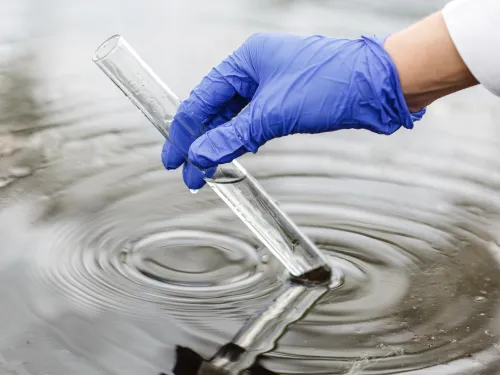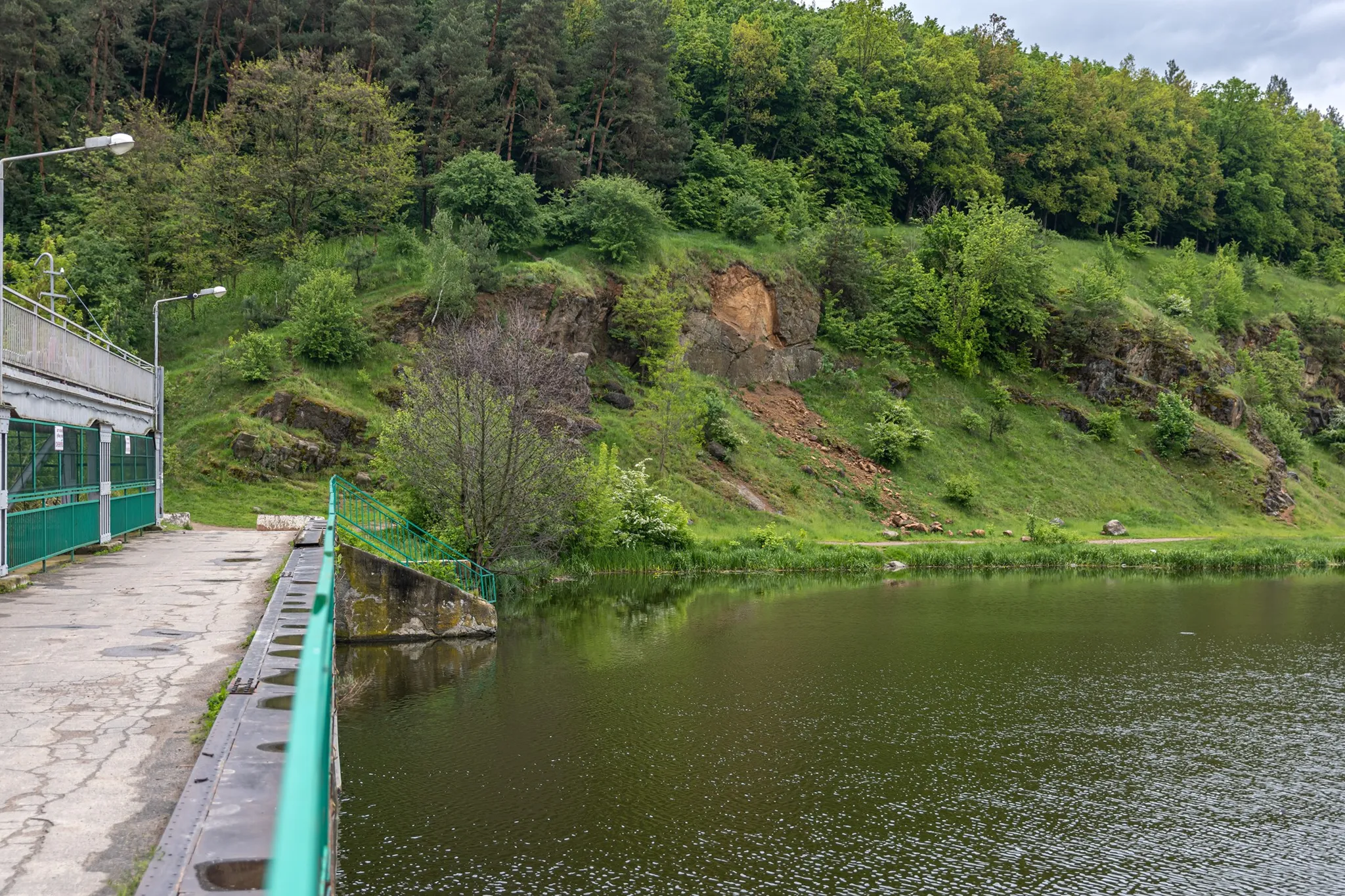Overview
Alternative wastewater treatment makes use of biological wastewater treatment to achieve wastewater cleanup. Microbial life forms together with enzymes and bacteria breakdown organic waste materials that exist in sewage as well as industrial effluents.
Water purification takes place through this process which makes it safe to either reuse or discharge. The waste disposal method provides cost-efficient and eco-friendly solutions. Industries obtain environmental compliance as well as water resource preservation through biological process wastewater treatment techniques.
With a focus on sustainability, we provide customized treatment systems that promote cleaner environments and healthier communities. We believe in offering efficient and responsible wastewater management solutions.
Bioculture for STP and ETP
Bioculture is a powerful blend of beneficial microbes designed to optimize wastewater treatment. Whether used in a Sewage Treatment Plant (STP) or an Effluent Treatment Plant (ETP), bioculture significantly enhances the breakdown of organic waste, improves treatment efficiency, and helps control odour.
In STPs, bioculture for STP accelerates the growth of MLSS (Mixed Liquor Suspended Solids), enhances BOD (Biochemical Oxygen Demand) and COD (Chemical Oxygen Demand) reduction, and stabilizes the treatment process, leading to cleaner effluent and smoother operation.
For ETPs, bioculture for ETP is specifically formulated to endure higher contaminant loads, varying pH levels, and extreme conditions, making it ideal for industrial wastewater treatment. This ensures that even challenging effluents are treated effectively.
Choosing the right bio culture for ETP or STP not only improves treatment performance but also reduces operational costs, minimizes sludge buildup, and enhances long-term plant sustainability.
How Bioculture Improves STP Efficiency
Bioculture plays a critical role in improving the efficiency of Sewage Treatment Plants (STP) by enhancing the biological treatment process. By introducing specialized microbial strains, STP bio culture accelerates the breakdown of organic matter, leading to faster and more effective treatment.
- Accelerates MLSS Development: Bioculture for STP helps rapidly develop MLSS (Mixed Liquor Suspended Solids), boosting microbial activity for faster treatment.
- Enhances BOD and COD Reduction: It improves the breakdown of organic matter, leading to better BOD and COD reduction, which helps meet discharge standards.
- Reduces Sludge Generation: By optimizing microbial activity, bio culture for STP reduces sludge buildup, lowering maintenance costs and disposal needs.
- Stabilizes Treatment Process: Bioculture ensures consistent performance even with varying influent quality, improving overall plant stability.
- Controls Odour: The microbial activity in bio culture for STP helps control unpleasant odors, making the treatment process more efficient and pleasant.
Bio Culture for ETP: Key Insights
- Effective in Industrial Effluent Treatment: Bio culture for ETP is specially formulated to handle the complexities of industrial wastewater, including high chemical loads and varying pH levels.
- Boosts Pollutant Breakdown: The microorganisms in bio culture for ETP accelerate the breakdown of harmful organic pollutants, improving effluent quality and reducing the need for chemical treatments.
- Enhances COD and BOD Reduction: Bio culture for ETP significantly improves the reduction of COD (Chemical Oxygen Demand) and BOD (Biochemical Oxygen Demand), ensuring that treated effluent meets stringent discharge standards.
- Tolerates Harsh Conditions: Unlike conventional treatments, bioculture for ETP is designed to thrive in challenging environments, maintaining high performance even under extreme conditions like fluctuating temperatures and contaminant levels.
- Cost-Effective Solution: By optimizing the microbial activity, bioculture for ETP reduces operational costs and the need for additional chemicals, making it a more economical choice for long-term wastewater management.
Biological Treatment Methods
Biological treatment processes use natural microorganisms to break down wastewater pollutants. Different types are used for various industrial and municipal applications.
1. Aerobic Biological Treatment of Wastewater
Aerobic biological treatment of wastewater uses oxygen to support bacteria that break down organic matter. This method is highly effective in treating wastewater from industries such as food processing, textiles, and municipal treatment plants.
Aerobic treatment reduces pollutants like Biochemical Oxygen Demand (BOD) and Chemical Oxygen Demand (COD) for cleaner water. It is often used in activated sludge systems, trickling filters, and oxidation ponds. The process also minimizes odors and improves water clarity. Hence, making it an environmentally friendly choice.
2. Anaerobic Treatment of Wastewater
Anaerobic treatment of wastewater operates without oxygen, relying on anaerobic bacteria to break down organic materials. This process is particularly effective for high-strength industrial wastewater from food, dairy, and beverage industries.
Systems like Upflow Anaerobic Sludge Blanket (UASB) reactors reduce BOD and COD levels while producing biogas, a renewable energy source.
Bioremediation wastewater treatment using anaerobic processes also minimizes sludge generation, lowering operational costs. Amoda provides efficient anaerobic solutions, helping industries meet environmental regulations and reduce their carbon footprint. Our tailored systems ensure optimal performance in managing complex wastewater challenges.
Our Product Range
Amoda Chem offers a specialized range of products designed to optimize biological wastewater treatment processes. Our wastewater treatment chemicals are eco-friendly, effective, and tailored to meet the unique needs of various industries.
AMODA Microclean 01 is formulated to reduce COD and BOD levels in industrial effluents. By enhancing microbial activity, it accelerates organic waste breakdown. Ideal for use in wastewater treatment plant chemicals, this product ensures cleaner effluent discharge while complying with environmental standards.
Application: Industrial Effluent Treatment PlantsDosage: Varies Based on Specific Applications
Designed for biological wastewater treatment in residential, commercial, and industrial sewage systems. AMODA Microclean 02 effectively promotes the bioremediation process of wastewater treatment. It supports beneficial bacteria, ensuring efficient organic waste degradation.
Application: Residential Apartments, Offices, Hospitals, Hotels, Restaurants, Membrane Bioreactor, Sequence Bioreactor, Moving Bed Bioreactor, and Rotating Biological Contractor.Dosage: Varies Based on Specific Application
For industries like breweries, dairy, and food processing, AMODA Microclean 03 is an excellent choice for anaerobic treatment of wastewater. It aids in reducing COD levels in wastewater treatment while producing biogas, contributing to sustainable energy use.
Applications: Breweries, Dairy, Food Industries and UASB ReactorsDosage: Varies Based on Specific Application <
AMODA Microclean 04 is a concentrated blend of microorganisms designed for hospital wastewater treatment. It effectively treats hospital discharge water containing chemicals and multi-resistant microbial agents. The product breaks down complex biological, chemical, and radioactive effluents while eliminating resistant bacteria, viruses, and prions. It also helps in reducing biomedical sludge generation, minimizing odor and controlling radioactive toxins in effluents. Thus, lowering both Biochemical Oxygen Demand (BOD) and Chemical Oxygen Demand (COD).
Applications: Multispecialty Hospitals & LaboratoriesDosage: 200g / 10,000 Ltrs of Effluent
AMODA Microclean 05 produces a probiotic blend for oil and grease treatment. It degrades oil, grease, and organic waste, converting them into carbon dioxide and water. The product also forms a protective coating on oil traps and drain lines, reducing grease and organic matter buildup. It is effective in degrading oil and grease from STP and ETP traps, minimizing membrane clogging and fouling. Also, protects pipelines and equipment from blockages. Hence, supporting biological treatment processes, and enhances organic load removal.
Applications: Industrial ETP & STP plants and effluent intake networksDosage: Varies Based on Specific Application
Today, acetic and alkaline sanitation chemicals are commonly used for toilet flushing. These chemicals kill beneficial bacteria in septic systems, causing bad odor and contamination. AMODA Microclean 06 produces a blend of 100% naturally occurring microorganisms for septic bio cleaning. It is a biological solution for residential and commercial septic systems, holding tanks, and portable bio toilets. The product contains colony-forming microorganisms that break down biodegradable materials. It decomposes feces, urine, grease, fats, food scraps, and detergents. Microclean 06 reduces foul odors and sludge buildup, which minimizes septic tank pump-outs and helps meet CPCB norms.
Applications: Residents, Commercial Septic Tanks & Bio Digester.Dosage: 250g / 5000 Litres
AMODA Microclean 07 produces a special blend of bacteria for lake and pond cleaning. It digests organic waste from animals and plants in water bodies. The product breaks down nitrogen and phosphorus compounds, reducing BOD and COD levels. It stabilizes oxygen levels at the bottom of ponds and clarifies the water. It also controls nitrates, phosphates, organic sludge, and odors, improving the overall aquatic environment.
Applications: Lake & Ponds.Dosage: 1–2.5 kg / Acre – 3 times weekly
AMODA Microclean 08 produces a blend of naturally selected bacteria for organic waste composting. It ensures short-time biodegradation and converts waste into rich compost. The product is safe and natural, reducing bad odors during the process. It also provides an economical solution for producing large volumes of compost.
Applications: Hotels, Communities & HostelsDosage: 100g / 100kg compost
Water Quality with Proven Treatment Methods
Benefits
Biological wastewater treatment offers a reliable and eco-friendly solution for managing wastewater across various industries.

Eco-Friendly and Sustainable
Biological treatment uses microorganisms to break down organic contaminants, reducing the reliance on harsh chemicals. This minimizes the environmental footprint and promotes safer water discharge. The use of bio cultures enhances the process, making it a greener alternative to conventional methods.
This helps to reduce sludge generation, lowering disposal concerns. Biological processes also consume less energy compared to chemical treatments, further reducing carbon emissions.

Cost-Effective
Implementing biological treatment significantly reduces operational costs over time. With fewer chemicals required for treatment, industries can reduce chemical costs involved in wastewater treatment.
Also, the bioremediation process efficiently reduces pollutants, leading to less frequent maintenance and improved system longevity. Another major advantage is its ability to reduce ammoniacal nitrogen generation, contributing to lower regulatory fines and compliance costs. Industries also benefit from the reduced need for sludge disposal, saving both time and money.

Improvement in Water Quality
Biological treatment plays a crucial role in enhancing water quality. Through natural degradation, it achieves effective wastewater BOD reduction and lowers COD levels. This results in clearer, safer water that meets discharge regulations. By effectively managing organic pollutants, it is easy to understand how to reduce cod in wastewater treatment.
The treatment also significantly reduces foul odors, creating healthier environments for nearby ecosystems and communities. Hence, treated water can be safely reused in industrial processes, reducing water consumption and supporting water conservation efforts.

Why Choose Us?
Amoda Chem provides reliable and eco-friendly biological wastewater treatment solutions. We are dedicated to quality and innovation, making us a trusted partner for wastewater management. Every industry has unique needs, and we offer customized treatment solutions to address specific challenges. Our bio-culture products effectively lower BOD and COD levels, ensuring compliance with regulations. Our advanced microbial technology improves the efficiency of the treatment process. Specialized microbial strains break down contaminants quickly, reducing operational costs. Our solutions also minimize chemical use, reduce sludge generation, and lower energy consumption, leading to a smaller environmental footprint. Thus, our products aid in ammoniacal nitrogen reduction, making water safer for discharge or reuse.
We offer a wide range of products tailored for industries like food processing, textiles, and municipal wastewater facilities. Whether your goal is to enhance treatment plant performance, reduce sludge handling costs, or comply with stringent regulations, Amoda has the right solution. Our innovative products ensure the biological process remains efficient and sustainable.
Our advanced team offers complete support, from designing systems to regular maintenance. We collaborate with clients to ensure effective and consistent results. With years of industry experience, we have established a strong reputation for delivering reliable solutions. Our commitment to excellence helps clients achieve cleaner water and meet environmental standards. Choose Amoda Chem for practical, efficient, and eco-friendly wastewater treatment solutions. Experience dependable results with our innovative and tailored approach to wastewater management.
Frequently Asked Questions
BOD (Biochemical Oxygen Demand) measures the amount of oxygen needed to break down organic matter in wastewater. Wastewater BOD reduction using bio cultures, efficient aeration, and proper biological treatment processes.
COD (Chemical Oxygen Demand) measures the total oxygen required to oxidize pollutants. COD reduction in wastewater treatment is done using anaerobic systems, bioremediation, and microbial cultures that break down complex organic compounds effectively.
In biological wastewater treatment, eco-friendly chemicals like microbial cultures, enzymes, and nutrient supplements are used. These chemicals used in wastewater treatment promote natural degradation.
Bacterial culture for wastewater treatment introduces beneficial microbes. These consume organic pollutants, reducing BOD and COD levels. They accelerate the treatment process, improve water quality, and ensure compliance with environmental regulations.
Bio culture for STP price depends on plant capacity, daily wastewater volume, and organic load. Larger plants need more bioculture, which increases the cost. The product form—powder or liquid—also affects pricing. Our STP bio culture, for example, has a concentration of 100 million bacteria per gram, offering reliable efficiency at a competitive price.
Higher-quality STP bio culture offers better performance with faster waste breakdown and lower sludge generation. For instance, our ETP bio culture contains 1.2 billion bacteria per gram, making it ideal for tough industrial effluents, while the STP variant holds 100 million bacteria per gram - balanced for domestic or municipal use. Quality impacts both pricing and long-term results.
Yes, STP bio culture can be customized based on your plant's size, effluent type, and treatment goals. Custom solutions ensure better efficiency and optimized dosing.

